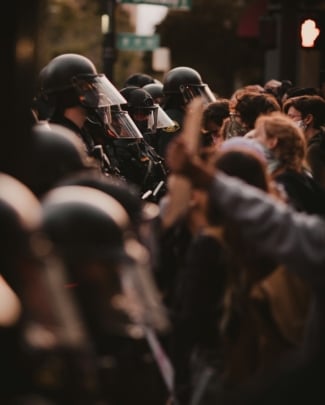IMPEACHMENT AND HOW IT WORKS
PLAGUE OF LOCUSTS HITS MIDDLE EAST RIGHT
MASSACRE AT CHURCH IN ETHIOPIA AND THE ARK OF THE COVENANT
GOP UNITES TO OPPOSE TRUMP IMPEACHMENT TRIAL
ILLINOIS PROPOSAL TO MANDATE ONE VIEW TAUGHT BY TEACHERS
IMPEACHMENT AND HOW IT WORKS
Here is a good summary of the history of impeachment. For more discussion on whether it is constitutional to try a former president for impeachment, read this IFA article.
Impeachment is a process in the House of Representatives that makes up the first major step required to remove a government official from office. Impeachment has been used infrequently in the United States—at either the federal or state level—and even less so in Britain, where the legal concept was first created and used. . . .
Article 2 of the Constitution
After much debate at the 1787 Constitutional Convention in Philadelphia, the attendees—among them George Washington, Alexander Hamilton and Benjamin Franklin—approved the concept behind the impeachment of government officials.
Adapted from British law, the impeachment process was included in Article 2, Section 4 of the U.S. Constitution, the document that serves as the foundation of the American system of government. . . .
What Crimes Are Impeachable?
Article 2, Section 4 states that the “President, Vice President and all civil Officers of the United States, shall be removed from Office on Impeachment for, and Conviction of, Treason, Bribery, or other high Crimes and Misdemeanors.” This describes an abuse of power by a high-level public official.
How the Impeachment Process Works
Generally, the first step in the impeachment process in the House of Representatives is to hold a formal inquiry into whether or not there are grounds for impeachment. This can be carried out by a House committee or an independent counsel. The House of Representatives can also just hold a floor vote on articles of impeachment without any committee or panel vetting them. . . .
Based on the findings of a House committee or independent panel, the House Judiciary Committee can then draft and approve articles of impeachment. These articles may then go to the House floor for a vote. If the articles are passed by a simple majority, the matter moves to the Senate.
Senate Trial Follows House Impeachment Vote
The Senate then acts as courtroom, jury and judge, except in presidential impeachment trials, during which the chief justice of the U.S. Supreme Court acts as judge.
Punishment If Convicted: Removal and Possible Ban From Government Service
The Constitution allows for two types of punishments for a president found guilty of an impeachable offense: “Judgment in Cases of Impeachment shall not extend further than to removal from Office, and disqualification to hold and enjoy any Office of honor, Trust or Profit under the United States.”
The first punishment, removal from office, is automatically enforced following a two-thirds guilty vote. But the second punishment, disqualification from holding any future government position, requires a separate Senate vote. In this case, only a simple majority is required to ban the impeached president from any future government office for life. . . .
Who Becomes President If the President Is Impeached?
If the U.S. president is impeached, the first in line to succeed him or her is the vice president, followed by the speaker of the House of Representatives, the president of the Senate, and then the secretary of state.
Once the vice president becomes president, the 25 Amendment to the Constitution permits the vice president to name their own successor: “Whenever there is a vacancy in the office of the Vice President, the President shall nominate a Vice President who shall take office upon confirmation by a majority vote of both Houses of Congress.” . . .
Impeachment at the State Level
In addition to federal impeachment, state legislatures are also granted the power to impeach elected officials in 49 of the 50 states, with Oregon being the lone exception.
At the state level, the process of impeachment is essentially the same as at the national level: typically, the lower state legislative chamber (the state assembly) is charged with levying and investigating formal accusations before ultimately voting on articles of impeachment should there be evidence of possible misconduct.
If the lower body approves any article(s) of impeachment, the upper chamber (the state senate) conducts a hearing or trial on the charges, during which both the legislators and the accused may call witnesses and present evidence.
Once the evidence and testimony has been presented, the upper chamber of the state legislature—much like the U.S. Senate at the federal level—must vote on whether the charged official is guilty or innocent.
Usually, a supermajority (two-thirds majority or greater) is required for conviction and removal from office. . . .
(Excerpt from History. Article by J. Scott. Photo Credit: The White House Flickr.)
What are your thoughts about the impending impeachment trial? Share in the comments below!
Partner with Us
Intercessors for America is the trusted resource for millions of people across the United States committed to praying for our nation. If you have benefited from IFA's resources and community, please consider joining us as a monthly support partner. As a 501(c)3 organization, it's through your support that all this possible.


We use cookies to ensure that we give you the best experience on our website. If you continue to use this site we will assume that you are happy with it. Privacy Policy





Comments
I will still ask the question. How can you impeach a former President? What’s so ironic is that they went to great lengths for 4 years to make sure he wouldn’t be reelected. Now that they have succeeded (fraudulently of course) they want to have their cake and eat it too. It’s so evil to kick a man when he is down. They surely have shown their true colors. Praying that it all leads to their failure.